In the fast-paced digital realm, website speed is not just a luxury; it’s a necessity. A slow-loading website can drive visitors away, impacting user experience and even search engine rankings. Fortunately, for WordPress users, optimizing website speed is well within reach. In this article, we’ll explore practical and proven ways to boost the speed of your WordPress website, ensuring a seamless and enjoyable browsing experience for your audience.

Optimize Images:
Large images are a common culprit behind slow-loading websites. Compress and resize your images before uploading them to WordPress. Additionally, consider using image optimization plugins that automatically compress images without compromising quality. This reduces page load times and improves overall site performance.
Leverage Browser Caching:
Enable browser caching to store static files on a visitor’s device, reducing the need to reload them each time they revisit your site. This not only accelerates loading times for returning visitors but also conserves server resources. WordPress plugins like W3 Total Cache or WP Super Cache can help you easily implement browser caching.
Minify CSS and JavaScript Files:
Minification involves removing unnecessary characters and spaces from CSS and JavaScript files, reducing their size and accelerating load times. Numerous plugins, such as Autoptimize, can automatically minify your site’s CSS, JavaScript, and even HTML, streamlining your website’s performance.
Utilize Content Delivery Networks (CDN):
Implementing a CDN involves distributing your website’s static content across multiple servers globally. This reduces the physical distance between the user and the server, resulting in faster loading times. Services like Cloudflare or MaxCDN offer easy integration with WordPress and can significantly enhance your website’s speed.
Optimize Database:
Regularly clean up your WordPress database by removing unnecessary data, such as post revisions, spam comments, and unused tables. Optimize database queries using plugins like WP-Optimize or WP-Sweep. A leaner database translates to quicker response times when users interact with your site.
Choose a Lightweight Theme:
The theme you choose plays a pivotal role in your site’s speed. Opt for lightweight and well-coded themes that prioritize performance. Premium themes often come with optimization features, ensuring that your website remains fast and responsive.
Enable GZIP Compression:
GZIP compression reduces the size of your website’s files before they are sent to the user’s browser. Enabling GZIP compression can significantly decrease the amount of data transferred, leading to faster loading times. Many hosting providers offer GZIP compression as a standard feature.
Implement Lazy Loading:
Lazy loading delays the loading of non-essential elements (such as images) until they are about to be displayed on the user’s screen. This can be particularly effective for websites with extensive visual content. Various lazy loading plugins are available for WordPress, making implementation hassle-free.
Upgrade Hosting Plan:
If you’re experiencing consistently slow loading times, it might be time to consider upgrading your hosting plan. A robust and optimized hosting environment, especially one that specializes in WordPress hosting, can significantly improve your website’s speed and overall performance.
A swift and responsive website is a key component of a positive user experience. By implementing these proven strategies, you can enhance the speed of your WordPress website, ensuring that visitors can navigate seamlessly through your content. Regular monitoring and optimization are key; stay vigilant and continue to fine-tune your site for optimal performance. Remember, a faster website not only delights visitors but also contributes positively to your search engine rankings.



